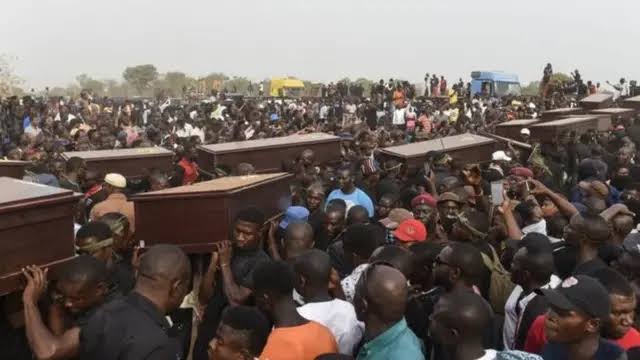The blood-soaked soil of Yelewata in the Guma Local Government Area of Benue State tells a harrowing story of human tragedy. More than 100 people were slaughtered in a brutal overnight attack by suspected armed herders on Friday, June 14, 2025. Survivors say the violence started around 10 p.m. and lasted into the early hours of Saturday, leaving homes burnt, lives shattered, and a community in mourning.
Amnesty International described the killings as horrifying, stating that many victims were trapped in their homes and burned alive. The rights group blamed government inaction and failed security strategies, warning that if decisive measures aren’t taken, more lives will be lost.
Benue State, known as the food basket of the nation, has witnessed repeated bloodshed, with farming communities often bearing the brunt. The people of Yelewata are predominantly farmers. With their homes destroyed and their farms abandoned, food insecurity looms over the region.
Among the dead were children, elderly people, and even pregnant women. Survivors recounted how entire families were wiped out. “I lost my husband, two sons, and my mother-in-law in one night,” said 37-year-old Deborah Tersoo, sobbing uncontrollably. “There was no one to help us. We were left to die.”
Medical personnel at the Benue State University Teaching Hospital (BSUTH) are overwhelmed by the number of injured. Many victims have gunshot wounds, burns, and machete cuts. Blood donations have been requested to support emergency treatment.
The attack also claimed the lives of three security personnel, including two soldiers and a member of the Nigeria Security and Civil Defence Corps (NSCDC), who were ambushed en route to the scene. Their deaths underscore the severe danger confronting even those tasked with protecting the people.
President Bola Ahmed Tinubu visited the affected community on Monday, offering condolences and vowing that justice would be served. During his speech, he assured the victims that the government would leave no stone unturned in tracking the perpetrators. He also promised a swift review of the nation’s security architecture.
“This is not just an attack on Benue; this is an attack on the soul of Nigeria,” President Tinubu declared. “We cannot allow our citizens to continue living in fear.”
However, for many, these promises echo past political reassurances that yielded no concrete action. Community leaders are demanding not just words but measurable change. “We’ve buried too many people,” said Chief Terlumun Iorfa.
“This cycle of mourning must end.”
Analysts warn that the government’s failure to protect rural communities is breeding resentment and mistrust in the state apparatus. “If the state cannot safeguard its people, then what is its purpose?” asked human rights advocate Barrister Eunice Uba.
Security experts have called for establishing well-equipped forward operation bases in vulnerable rural communities. They argue that reactive measures are insufficient; the country needs a proactive strategy that includes intelligence gathering, local vigilante training, and community engagement.
Furthermore, the attack highlights the urgent need to resolve Nigeria’s long-standing farmer-herder conflict.
Environmental degradation, land scarcity, and population growth have exacerbated the tension between nomadic herders and sedentary farmers.
There are calls for the federal government to fast-track the implementation of ranching policies and support displaced persons through rebuilding efforts, trauma counseling, and economic rehabilitation.
Women and children remain the most vulnerable in this crisis. Displaced families now seek refuge in overcrowded IDP camps where access to clean water, sanitation, and food is extremely limited.
International bodies, including the UN and ECOWAS, have expressed concern over the situation. In a joint statement, they urged the Nigerian government to uphold its responsibility of protecting lives and property as enshrined in the constitution.
The Yelewata massacre is not just another statistic. It is a national tragedy that reveals the fragility of Nigeria’s internal security and the urgent need for structural reforms.
As the people of Yelewata bury their dead and mourn their losses, the nation must reflect deeply on the true cost of neglect. The question remains: When will it end?
Now is the time for Nigeria to rise above rhetoric and act decisively. If not for the sake of the present, then for the generations whose lives hang in the balance.

